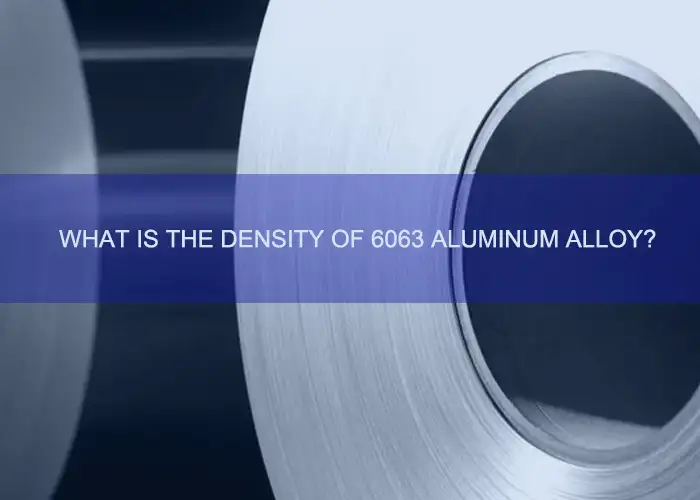Aluminum alloy is a very versatile material due to its light weight, strength, corrosion resistance, and ease of fabrication.
Aluminum and its alloy have low densities; therefore, it is most widely used in the aviation industry. Due to its unique properties, aluminum is used in a wide range of applications. The density of aluminum is 2.71 g/cm3 or 2710 kg/m3, and it is 1/3 of the stainless steel.
Due to the density difference, aluminum alloy is lighter than stainless steel but not far behind in strength.
Aluminum has excellent strength with a lightweight nature; therefore, it is known for its high strength-to-weight ratio. These properties result in a material that is simple to work with while also being durable and resistant to a wide range of industrial applications.
Due to its low density, aluminum is widely used in the aerospace sector and other transportation fields. Because of its corrosion resistance, it is used in food and chemical processing (cookware, pressure vessels, etc.) as well as architectural applications.
When considering the density of aluminum alloy, you’ve arrived at the appropriate place.
If you want to learn more about the aluminum alloy density, this article is very helpful for you.
Let’s keep reading.
What is the Density of Pure Aluminum?
The pure solid form of aluminum has less density than its alloys, and it is about 2699 kg/m3 or 2.69 g/cm3.
Aluminum is distinguished by its silvery-white appearance with a bluish tint. It is a soft metal in its pure state, but its hardness will increase and become strong when alloyed with other metals like copper, zinc, and manganese.
Pure aluminum has a liquid density of 2,357 kg/m3 at 700 C° and 2,304 kg/m3 at 900 C°.
Unalloyed aluminum is a soft, malleable, corrosion-resistant metal with a high electrical conductivity. It is frequently used for foil and conductor cables but must be alloyed with other elements to achieve the higher strengths required for other uses.
The tensile strength of pure aluminum is low. However, alloying metals such as manganese, silicon, copper, and magnesium can improve the strength qualities of aluminum.
What is the Density of 6063 Aluminum Alloy?

The density of 6063 aluminum alloys is given below in different units:
2700 kg/m3, 2.7 g/cm3 0.0975 lbs /in3 and 168.56 lbs/ ft3
Magnesium and silicon are the main alloying elements for this specific alloy of aluminum.
This alloy is most commonly used in window frames, doors, shop fittings, irrigation tubes, and architectural applications.
How to Calculate the Density of Aluminum?
The density of an element is calculated by dividing its mass by its volume: p (density) = m (mass)/v (volume).
Density is a calculation used in the aluminum industry that considers the density of pure aluminum and its composition with additional alloying elements.
The aluminum association’s estimated densities can be used to assist users in calculating weight per unit area, weight per unit length, and covering area.
How Density Varies by Type of Aluminum?
While pure aluminum has a density of around 2.7 g/cm3, using alloys may allow that value to differ slightly. Heavier alloying components will raise the weight of the product.
For example, alloys in the 1xxx series have densities similar to pure aluminum; in fact, alloys in this range are 99% pure commercial aluminum.
On the other hand, alloys of the 7xxx and 8xxx series can achieve densities as high as 2.9 kg/m3. At 2.81 g/cm3, 7075 aluminum has a higher density than other alloys. As a result, 7075 aluminum has one of the highest tensile strengths of any alloy (its ultimate tensile strength is approximately double that of common 6061 aluminum).
Additionally, alloys in the 4xxx family can produce densities that are less than 2.7 g/cm3. Only one number of this series, 4145, has a density of more than 2.7 g/cm3; it has 2.74 g/cm3. Silicon is the primary alloy element for the 4xxx series of alloys. In certain amounts, silicon reduces the specific gravity of aluminum.
Weight & Density of Aluminum
Aluminum’s significant and well-known property is its lightweight.
With a combination of titanium and magnesium, the metal has an atomic weight of 26.98 and a density is 2.70 g/cm3, making it roughly one-third the weight of other regularly used metals like stainless steel.
Aluminum weighs 0.0975 pounds per cubic inch or 2.7 grams per cubic centimeter.
Different Grades Aluminum Alloys Density Data Sheet
| Room Temperature Density Values for Aluminum Alloys | |||||
| Aluminum Alloy | Density (g/cm3) | Density (kg/m3) | Density (g/mm3) | Density (lbs/in3) | Density (lbs/ft3) |
| 1050 | 2.710 | 2705 | 0.0027 | 0.0977 | 168.87 |
| 1060 | 2.710 | 2705 | 0.0027 | 0.0977 | 168.87 |
| 1100 | 2.710 | 2710 | 0.0027 | 0.0979 | 169.18 |
| 1145 | 2.700 | 2700 | 0.0027 | 0.0975 | 168.56 |
| 1175 | 2.700 | 2700 | 0.0027 | 0.0975 | 168.56 |
| 1200 | 2.700 | 2700 | 0.0027 | 0.0975 | 168.56 |
| 1230 | 2.700 | 2700 | 0.0027 | 0.0975 | 168.56 |
| 1235 | 2.710 | 2705 | 0.0027 | 0.0977 | 168.87 |
| 1345 | 2.710 | 2705 | 0.0027 | 0.0977 | 168.87 |
| 1350 | 2.710 | 2705 | 0.0027 | 0.0977 | 168.87 |
| 2011 | 2.830 | 2830 | 0.0028 | 0.1022 | 176.67 |
| 2014 | 2.800 | 2800 | 0.0028 | 0.1012 | 174.80 |
| 2017 | 2.790 | 2790 | 0.0028 | 0.1008 | 174.17 |
| 2018 | 2.820 | 2820 | 0.0028 | 0.1019 | 176.05 |
| 2024 | 2.780 | 2780 | 0.0028 | 0.1004 | 173.55 |
| 2025 | 2.810 | 2810 | 0.0028 | 0.1015 | 175.42 |
| 2036 | 2.750 | 2750 | 0.0028 | 0.0994 | 171.68 |
| 2117 | 2.750 | 2750 | 0.0028 | 0.0994 | 171.68 |
| 2124 | 2.780 | 2780 | 0.0028 | 0.1004 | 173.55 |
| 2218 | 2.810 | 2810 | 0.0028 | 0.1015 | 175.42 |
| 2219 | 2.840 | 2840 | 0.0028 | 0.1026 | 177.30 |
| 2618 | 2.760 | 2760 | 0.0028 | 0.0997 | 172.30 |
| 3003 | 2.730 | 2730 | 0.0027 | 0.0986 | 170.43 |
| 3004 | 2.720 | 2720 | 0.0027 | 0.0983 | 169.80 |
| 3005 | 2.730 | 2730 | 0.0027 | 0.0986 | 170.43 |
| 3105 | 2.720 | 2720 | 0.0027 | 0.0983 | 169.80 |
| 4032 | 2.680 | 2680 | 0.0027 | 0.0968 | 167.31 |
| 4043 | 2.690 | 2690 | 0.0027 | 0.0972 | 167.93 |
| 4045 | 2.670 | 2670 | 0.0027 | 0.0965 | 166.68 |
| 4047 | 2.660 | 2660 | 0.0027 | 0.0961 | 166.06 |
| 4145 | 2.740 | 2740 | 0.0027 | 0.0990 | 171.05 |
| 4343 | 2.680 | 2680 | 0.0027 | 0.0968 | 167.31 |
| 4643 | 2.690 | 2690 | 0.0027 | 0.0972 | 167.93 |
| 5005 | 2.700 | 2700 | 0.0027 | 0.0975 | 168.56 |
| 5050 | 2.690 | 2690 | 0.0027 | 0.0972 | 167.93 |
| 5052 | 2.680 | 2680 | 0.0027 | 0.0968 | 167.31 |
| 5056 | 2.640 | 2640 | 0.0026 | 0.0954 | 164.81 |
| 5083 | 2.660 | 2660 | 0.0027 | 0.0961 | 166.06 |
| 5086 | 2.660 | 2660 | 0.0027 | 0.0961 | 166.06 |
| 5154 | 2.660 | 2660 | 0.0027 | 0.0961 | 166.06 |
| 5183 | 2.660 | 2660 | 0.0027 | 0.0961 | 166.06 |
| 5252 | 2.660 | 2660 | 0.0027 | 0.0961 | 166.06 |
| 5254 | 2.660 | 2660 | 0.0027 | 0.0961 | 166.06 |
| 5356 | 2.640 | 2640 | 0.0026 | 0.0954 | 164.81 |
| 5454 | 2.690 | 2690 | 0.0027 | 0.0972 | 167.93 |
| 5456 | 2.660 | 2660 | 0.0027 | 0.0961 | 166.06 |
| 5457 | 2.690 | 2690 | 0.0027 | 0.0972 | 167.93 |
| 5554 | 2.690 | 2690 | 0.0027 | 0.0972 | 167.93 |
| 5556 | 2.660 | 2660 | 0.0027 | 0.0961 | 166.06 |
| 5652 | 2.670 | 2670 | 0.0027 | 0.0965 | 166.68 |
| 5654 | 2.660 | 2660 | 0.0027 | 0.0961 | 166.06 |
| 5657 | 2.690 | 2690 | 0.0027 | 0.0972 | 167.93 |
| 6003 | 2.700 | 2700 | 0.0027 | 0.0975 | 168.56 |
| 6005 | 2.700 | 2700 | 0.0027 | 0.0975 | 168.56 |
| 6053 | 2.690 | 2690 | 0.0027 | 0.0972 | 167.93 |
| 6061 | 2.700 | 2700 | 0.0027 | 0.0975 | 168.56 |
| 6063 | 2.700 | 2700 | 0.0027 | 0.0975 | 168.56 |
| 6066 | 2.720 | 2720 | 0.0027 | 0.0983 | 169.80 |
| 6070 | 2.710 | 2710 | 0.0027 | 0.0979 | 169.18 |
| 6101 | 2.700 | 2700 | 0.0027 | 0.0975 | 168.56 |
| 6105 | 2.690 | 2690 | 0.0027 | 0.0972 | 167.93 |
| 6151 | 2.710 | 2710 | 0.0027 | 0.0979 | 169.18 |
| 6162 | 2.700 | 2700 | 0.0027 | 0.0975 | 168.56 |
| 6201 | 2.690 | 2690 | 0.0027 | 0.0972 | 167.93 |
| 6262 | 2.720 | 2720 | 0.0027 | 0.0983 | 169.80 |
| 6351 | 2.710 | 2710 | 0.0027 | 0.0979 | 169.18 |
| 6463 | 2.690 | 2690 | 0.0027 | 0.0972 | 167.93 |
| 6951 | 2.700 | 2700 | 0.0027 | 0.0975 | 168.56 |
| 7005 | 2.780 | 2780 | 0.0028 | 0.1004 | 173.55 |
| 7008 | 2.780 | 2780 | 0.0028 | 0.1004 | 173.55 |
| 7049 | 2.840 | 2840 | 0.0028 | 0.1026 | 177.30 |
| 7050 | 2.830 | 2830 | 0.0028 | 0.1022 | 176.67 |
| 7072 | 2.720 | 2720 | 0.0027 | 0.0983 | 169.80 |
| 7075 | 2.810 | 2810 | 0.0028 | 0.1015 | 175.42 |
| 7175 | 2.800 | 2800 | 0.0028 | 0.1012 | 174.80 |
| 7178 | 2.830 | 2830 | 0.0028 | 0.1022 | 176.67 |
| 7475 | 2.810 | 2810 | 0.0028 | 0.1015 | 175.42 |
| 8017 | 2.710 | 2710 | 0.0027 | 0.0979 | 169.18 |
| 8030 | 2.710 | 2710 | 0.0027 | 0.0979 | 169.18 |
| 8176 | 2.710 | 2710 | 0.0027 | 0.0979 | 169.18 |
| 8177 | 2.700 | 2700 | 0.0027 | 0.0975 | 168.56 |
Aluminum Weight Calculation
For the weight calculation of aluminum, you must know the volume and density of the specific piece or object.
As discussed above, the density of the pure aluminum is 2.7 g/ cm3, and we calculate the volume with this formula:
Volume = length (L) x width (W) x thickness (T) or height
Weight = volume x density
If you find out the volume and density of a weighing object, you can easily calculate the weight using the given formula.
If you have a complex-shaped aluminum object, if possible, you may need to break it down into simpler shapes and then calculate their volumes independently before adding them up to find the total weight.
What is the weight of the aluminum strip?

Calculate the weight of a 1060 aluminum strip with dimensions of 0.15 m x 0.03 m x 0.005m (thickness: 5mm).
Take the density of 1060 alloy of aluminum, which is 2810 kg/m3.
The strip’s total volume is 0.15 x 0.03 x 0.005 = 0.0000225 m3.
The total weight = density x volume
Total weight = 2810 x 0.0000225 = 0.063225 kg
Conclusion
Aluminum alloys are most widely used in many applications due to their lightweight and excellent strength.
Combining aluminum with other alloying elements makes it stronger, durable, and resistant to corrosion. These properties depend upon their composition.
The density of aluminum plays a vital role in many industries, especially in aircraft manufacturing.
Keep in mind that there’s more complexity beneath the surface when it comes to aluminum and materials in general. Therefore, acquainting ourselves with its distinct properties is crucial for maximizing its utility, especially for those engaged in alloy manufacturing, design, or engineering.
At HZW, you have access to premium-quality aluminum strips and foils available in the market. Feel free to consult our experts for your aluminum foils and stainless steel strips project needs.












